Some time ago, there was a #Fufuchallenge on the social media and it was so fun to watch. It was interesting to see so many people try to relish these African delicacies and the reactions were so lovely to see. The only flop was that the majority of those who participated in the challenge thought Fufu is just of a single type. Some said Fufu is from cassava. Some said it is from corn flour.
While they are not wrong, they are not completely right either because the truth is that, Fufu isn't of just a single type, made from a single ingredient. We have different types of Fufu in Africa and today, I will be showing you ten of them.
WHAT IS FUFU?
Fufu, also known as 'swallow' because of the manner in which it is eaten (swallowed with some soup/stew) is pronounced as foo-foo or foufou. Fufu is a staple food found in many countries in Central Africa, Western Africa and some Caribbean countries like the Dominican Republic.
Fufu is usually made by stirring, pounding, or kneading highly starchy crops like cassava or wheat into doughs.
Fufus are commonly made from cassava, yams, maize, plantain, wheat, corn, semolina, rice, sweet potatoes, or oatmeal.
For a satisfying, balanced meal, Fufus are usually eaten with African soups of different types. The type of soup determines to what extent you will enjoy your Fufu.
HOW IS FUFU MADE?
Fufu is made in different ways depending on the ingredient you are using. If you are using tubers like yam or cassava, or you are using plantain, on many occasions, you would have to peel first, then boil till it softens. Then pound in a large mortar, using a pestle till a stretchy spongy dough is formed.
Thankfully, technology has now made everything beautiful. So, many of these Fufus are available in powdery forms. If you are using any fufu flour then, you would only have to pour an amount into a pot of boiling water and stir till the texture becomes dough-like. This is done over high heat, using a turning stick and stirred very quickly to prevent the Fufu from becoming lumpy.
READ: UNDERSTANDING THE DIFFERENT PALM OIL BRANDS AT THE MY SASUN AFRICAN STORE
DIFFERENT TYPES OF FUFU
As you must have been able to deduce from my explanation from the beginning, Fufu is only a generic name. Different types of Fufus go by different names in different countries and they come in countless variations, tastes and textures.Fufus can be enjoyed in several ways depending on each person's preference. For instance, some would prefer a particular Fufu with a particular type of stew. Some prefer to eat certain types of Fufus at a particular time of the day or season; majority eat with their washed hands, while some weird ones eat theirs with forks! Oh, why spoil the fun? Haha
So, what are the ten variants of African Fufu that I would be introducing to you today?
1. CASSAVA FUFU
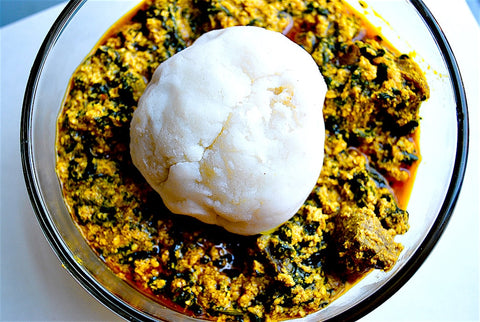
Cassava is one of the primary starches used to make fufu. Cassava fufu also known as Akpu, Loi-Loi, Santana is eaten in Liberia, Sierra Leone, Côte D' Ivoire, Nigeria, Ghana, Togo and Benin and more. It is usually made from fermented cassava and can be eaten with any stew of your choice: Groundnut stew, egusi, okra, tomato stew—whichever your heart desires.
2. GARRI FUFU
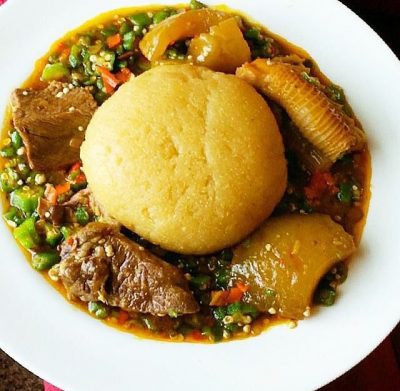
This fufu, widely known in Nigeria as Eba, is made of roasted, ground cassava (garri). This gives it a grainier texture than the regular cassava fufu. It has a sweet sour taste and is eaten across West Africa. Eba goes well with many stews and soups also, especially Egusi.
3. POUNDED YAM
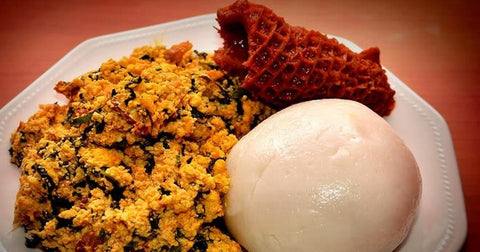
This delicious favourite fufu is made from cooked yams, pounded into a dough. Pounding yam into a smooth, mashed potato-like texture requires some arm strength but it's totally worth it in the end. It matches excellently well with vegetable, Egusi, okro or peanut stew.
4. AMALA
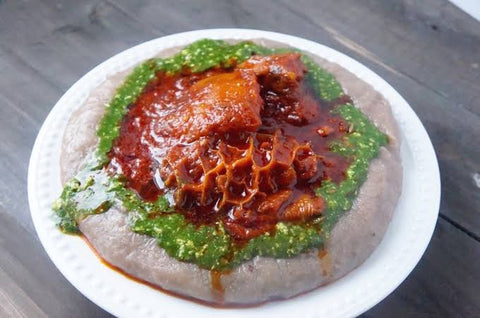
Known as Amala in Nigeria and Kokonte in Ghana, this delicious fufu is made from grounded, dried yam and yam peels. Another variant is made from grounded, dried cassava. Amala has a unique, brown (if from yam) or off-white (if from cassava) colours. And it also has a thick, slightly rubbery texture. It is popularly eaten with ewedu (jute leaves) stew by Yoruba people in Southern Nigeria and with edikaikong (green leaf soup) by the Efik people of Cross River State. You can as well enjoy Amala with Ogbonno soup.
5. SEMOLINA
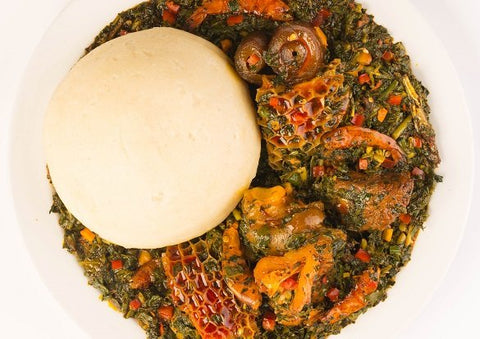
This fufu is made from Durum wheat which is the same wheat that is used in making pasta and couscous. Semolina fufu pairs well with a simple okra or red, tomato stew.
6. CORN MEAL

This is commonly known as ugali in Kenya and Tanzania, Posho in Uganda, Nshima in Malawi and Zambia, Sadza in Zimbabwe, Tuwo Masara in Nigeria. It is made from corn meal or millet flour. Its thick texture is similar to a porridge and when allowed to cool and form, it is easy to cut into balls for 'swallow'. You can pair with a number of soups and stews. I prefer cornmeal with 'draw soups' like Okro and Ewedu any day.
7. PLANTAIN FUFU
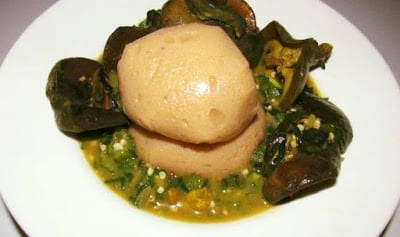
This is a lighter alternative to yam and cassava-based Fufus. It's basically blended unripe plantains cooked into a thick dough over a stove. It's eaten across West Africa. A variation of it, known as Matoke is widely eaten in Uganda. This Fufu pairs well with peanut soup, palm oil soup, leafy vegetable stew, and tomato stew.
8. OATMEAL FUFU
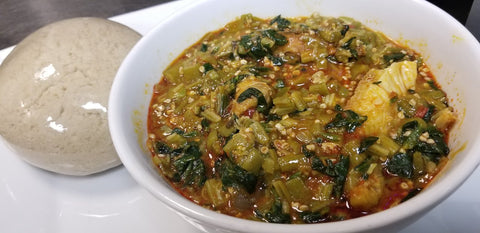
This is a modern type of Fufu. It came about as people tried to seek healthier ways to enjoy their Fufus. This Fufu is made from blended oats cooked in boiling water and constantly turned with a turning stick into a hardened dough. This fufu tends to dry easily, so it is better to eat it as soon as it is ready. For an even better experience, pair with delicious soups like Okro, Veggies, Groundnut or Ogbonno stews.
9. BANKU

Banku is a Ghanaian Fufu made of corn and cassava dough cooked with salt and formed into a white dough. It can be enjoyed with Shito and fried fish or Okra soup.
10. RICE MEAL FUFU

This rice-based fufu, known as Tuwo Shinkafa in Northern Nigeria, is a sticky, mashed rice meal, turned over the stove with a cooking stick and shaped into balls. It tastes like plain rice but can be enjoyed with any spicy, tasty stew of your choice.
So, Fufus aren't limited to corn flour and cassava alone. I have introduced you to just 10 but Africa even has many more.
READ: 8 NATURAL HOME REMEDIES FOR SORE THROAT
Have you eaten any of these before? Which is your favorite? Which are you planning to try soon? What soup do you love to pair with each of these Fufus? Which Fufu is more popular in your region/country?
You have read from me and I would also love to read from you. So, kindly endeavor to leave me comments in the comment box below. See you again soon!



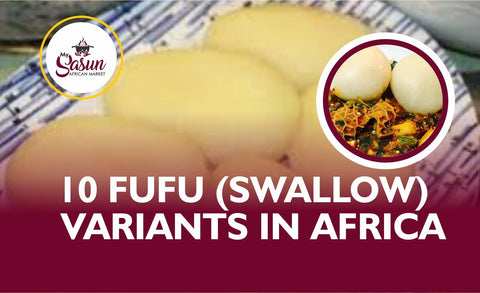
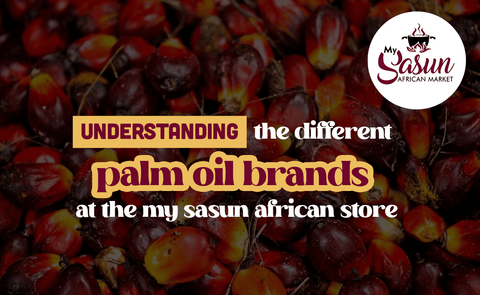


Comments (3)
Hello everyone, i have a very important information about herpes virus, i was a victim of hsv1&2 until i met doctor Ahonsie, it still feels like a dream to me. it has been two years now, i have not experience any breakout of herpes. I new about him through a post made on social media, a lady shares her experience and then i decided to contact him and ever since i contacted i was encourage and with no doubt i was cured from herpes simplex in just two weeks. He also treat other illnesses like HPV, HIV, CANCER, THYRIOD, PENIS ENLARGEMENT, and more contact him via Email: drahonsie00@gmail.com / WhatsApp: +2348039482367. https://drahonsie002.wixsite.com/dr-ahonsie https://www.facebook.com/drstellaherbalhome?mibextid=ZbWKwLThanks
Being the winner of a multi-million-dollar lottery certainly is a life-changing event for almost every single lottery winner. My name is Mavis Wanczyk from Chicopee, Massachusetts, the famous Powerball lottery winner of $758 million (£591m). I know many people would wonder how I had won the lottery. Would you believe me if I told you that I did it with spell casting? I met this famous spell caster known as Great Odunga and he was the one who did it for me. As shocking as it was to me, my famous comment to the press was “ I’m going to go and hide in my bed.” Never did I believe that Great Odunga made me wealthy overnight. If you want to have your chance of winning and becoming very wealthy just like me, contact Great Odunga at odungaspelltemple@outlook.com OR Email: odungaspelltemple@gmail.com and WHATS-APP HIM at +2348167159012 and you will be lucky. Thanks for reading and hope to see you at the top
This whole article is so interresting ! thank you